一般将来时
一般将来时
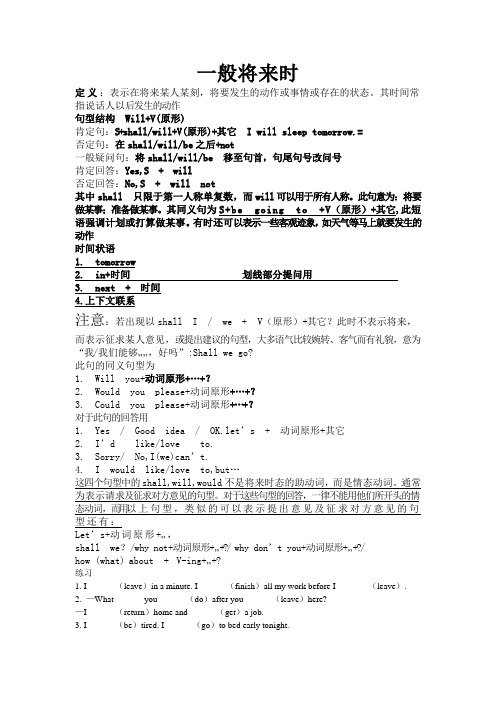
一般将来时定义:表示在将来某人某刻,将要发生的动作或事情或存在的状态。
其时间常指说话人以后发生的动作句型结构 Will+V(原形)肯定句:S+shall/will+V(原形)+其它 I will sleep tomorrow.=否定句:在shall/will/be之后+not一般疑问句:将shall/will/be 移至句首,句尾句号改问号肯定回答:Yes,S + will否定回答:No,S + will not其中shall 只限于第一人称单复数,而will可以用于所有人称。
此句意为:将要做某事;准备做某事。
其同义句为S+be going to +V(原形)+其它,此短语强调计划或打算做某事。
有时还可以表示一些客观迹象,如天气等马上就要发生的动作时间状语1. tomorrow2. in+时间划线部分提问用3. next + 时间4.上下文联系注意:若出现以shall I / we + V(原形)+其它?此时不表示将来,而表示征求某人意见,或提出建议的句型,大多语气比较婉转、客气而有礼貌,意为“我/我们能够……,好吗”:Shall we go?此句的同义句型为1. Will you+动词原形+…+?2. Would you please+动词原形+…+?3. Could you please+动词原形+…+?对于此句的回答用1. Yes / Good idea / OK.let’s+ 动词原形+其它2. I’d like/love to.3. Sorry/ No,I(we)can’t.4. I would like/love to,but…这四个句型中的shall,will,would不是将来时态的助动词,而是情态动词。
通常为表示请求及征求对方意见的句型。
对于这些句型的回答,一律不能用他们所开头的情态动词,而用以上句型,类似的可以表示提出意见及征求对方意见的句型还有:Let’s+动词原形+…,shall we?/why not+动词原形+…+?/ why don’t you+动词原形+…+?/how (what) about + V-ing+…+?练习1. I ______(leave)in a minute. I ______(finish)all my work before I ______ (leave).2. —What ______ you ______(do)after you ______(leave)here?—I ______(return)home and ______(get)a job.3. I ______(be)tired. I ______(go)to bed early tonight.4. Mary’s birthday is next Monday, her mother _____(give)her a present.( ) 1. There __________ a meeting tomorrow afternoon.A. will be going toB. will going to beC. is going to beD. will go to be ( ) 2. Charlie ________ here next month.A. isn’t workingB. doesn’t workingC. isn’t going to workingD. won’t work ( ) 3. He ________ very busy this week, he ________ free next week.A. will be; isB. is; isC. will be; will beD. is; will be( ) 4. There ________ a dolphin show in the zoo tomorrow evening.A. wasB. is going to haveC. will haveD. is going to be( ) 5. –________ you ________ free tomorrow?– No. I ________ free the day after tomorrow.A. Are; going to; willB. Are; going to be; willC. Are; going to; will beD. Are; going to be; will be( ) 6. Mother ________ me a nice present on my next birthday.A. will givesB. will giveC. givesD. give( ) 7. – Shall I buy a cup of tea for you?–________. (不,不要。
一般将来时用法总结
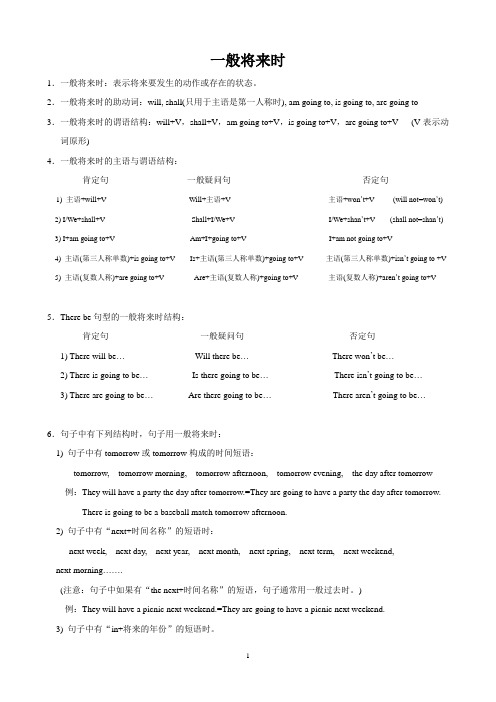
一般将来时1.一般将来时:表示将来要发生的动作或存在的状态。
2.一般将来时的助动词:will, shall(只用于主语是第一人称时), am going to, is going to, are going to3.一般将来时的谓语结构:will+V,shall+V,am going to+V,is going to+V,are going to+V (V表示动词原形)4.一般将来时的主语与谓语结构:肯定句一般疑问句否定句1) 主语+will+V Will+主语+V 主语+won’t+V (will not=won’t)2) I/We+shall+V Shall+I/We+V I/We+shan’t+V (shall not=shan’t)3) I+am going to+V Am+I+going to+V I+am not going to+V4) 主语(第三人称单数)+is going to+V Is+主语(第三人称单数)+going to+V 主语(第三人称单数)+isn’t going to +V5) 主语(复数人称)+are going to+V Are+主语(复数人称)+going to+V 主语(复数人称)+aren’t going to+V5.There be句型的一般将来时结构:肯定句一般疑问句否定句1) There will be…Will there be…There won’t be…2) There is going to be…Is there going to be…There isn’t going to be…3) There are going to be…Are there going to be…There aren’t going to be…6.句子中有下列结构时,句子用一般将来时:1) 句子中有tomorrow或tomorrow构成的时间短语:tomorrow, tomorrow morning, tomorrow afternoon, tomorrow evening, the day after tomorrow 例:They will have a party the day after tomorrow.=They are going to have a party the day after tomorrow.There is going to be a baseball match tomorrow afternoon.2) 句子中有“next+时间名称”的短语时:next week, next day, next year, next month, next spring, next term, next weekend,next morning…….(注意:句子中如果有“the next+时间名称”的短语,句子通常用一般过去时。
一般将来时
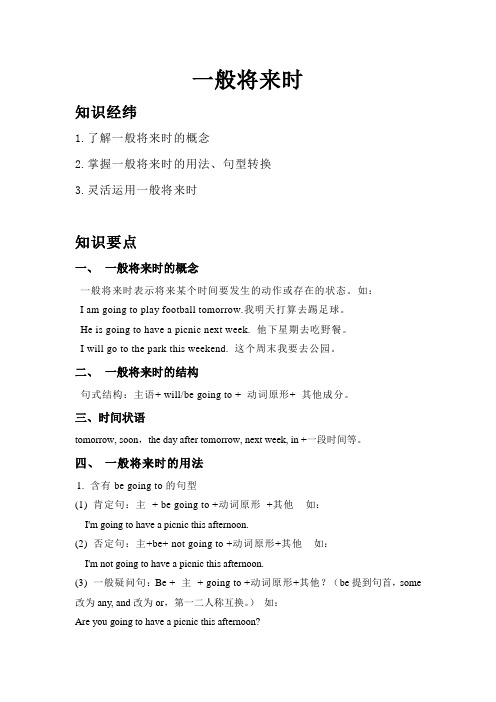
一般将来时知识经纬1.了解一般将来时的概念2.掌握一般将来时的用法、句型转换3.灵活运用一般将来时知识要点一、一般将来时的概念一般将来时表示将来某个时间要发生的动作或存在的状态。
如:I am going to play football tomorrow.我明天打算去踢足球。
He is going to have a picnic next week. 他下星期去吃野餐。
I will go to the park this weekend. 这个周末我要去公园。
二、一般将来时的结构句式结构:主语+ will/be going to + 动词原形+ 其他成分。
三、时间状语tomorrow, soon,the day after tomorrow, next week, in +一段时间等。
四、一般将来时的用法1. 含有be going to的句型(1) 肯定句:主+ be going to +动词原形+其他如:I'm going to have a picnic this afternoon.(2) 否定句:主+be+ not going to +动词原形+其他如:I'm not going to have a picnic this afternoon.(3) 一般疑问句:Be + 主+ going to +动词原形+其他?(be提到句首,some 改为any, and改为or,第一二人称互换。
)如:Are you going to have a picnic this afternoon?肯定回答:Yes, I am.否定回答:No, I’m not.2. 含有will的句型(will可用于所有人称,shall只用于第一人称I和we)( 1 ) 肯定句:主+ will +动词原形+其他如:I will play football tomorrow.(2) 否定句:主+ won’t +动词原形+其他(will后加not成won't)如:I won’t play football tomorrow.(3) 一般疑问句:Will + 主+ +动词原形+其他?(will提到句首,some改为any, and改为or,第一二人称互换) 如:Will you play football tomorrow?肯定回答:Yes, I will.否定回答:No, I won’t.五、一般将来时的特殊疑问句一般情况下,一般将来时的对划线部分有三种情况。
一般将来时态

this evening
What is the mouse going to do this evening? It is going to do its homework.
will
What is she going to do? She’s going to shop/ go shopping...
They are going to dance.
will
What are they going to do this evening? They are going to watch TV.
will
句式的变化规则:
1.变否定句—---在be/will后加not 。 2.变一般疑问句------将be/will动词提前。 (主语是第一人称I 时,变一般疑问句 时将I 变you) 3.特殊疑问句(也就是对划线部分提问) -----要用特殊疑问词what +一般疑问句。
表示“不肯”、“不能”等: e.g. We asked her to be the director but she won’t agree. Oil and water won’t mix. The car won’t start.
可表示未来情况的还有:
be going to 结构 现在进行时 一般现在时 be about to 结构 be + 不定式结构
系动词am,is,are的原形都是 。 例如: 系动词 , , 的原形都是be。 例如: 的原形都是 People will have robots in their home. 人们的家中将会有机器人。 人们的家中将会有机器人。 There will be one country in the world. 世界上将会只有一个国家。 世界上将会只有一个国家。 shall适用于第一人称 ,We;而will适用于所有人称。 适用于第一人称I, ; 适用于所有人称。 适用于第一人称 适用于所有人称 通常可以用will来代替 来代替shall。 通常可以用 来代替 。 will,shall均可缩写为:'ll,如: 均可缩写为: , , 均可缩写为 I will= I'll; ; she will = she’ll;will not 和shall not分别可以 ; 分别可以 缩写为 won't 和shan't。 。
一般将来时

由于will后接动词原形, 因此在 “there be”句型一般将来时的句中 will之后用be动词的原形, 即“be”一词, 无论后面是单、复数或不可数名 词(短语)。 e.g. There won’t be any paper money.
There will only be one country.
( ) 14. If it ________ tomorrow, we’ll go rollerskating.真实条件句用于陈述语气,表示存在的情况可能发生。其 中t if 是如果的意思。 A. isn’ rain B. won’t rain 在 if引导的是条件从句,用一般现在时, 主句用将来时。 C. doesn ’t rain D. doesn’t fine 主句中一般用shall/will 表示将来,而不用be going to 表
练习题
( ) 1. There __________ a meeting tomorrow afternoon.
A. will be going to C. is going to be
B. will going to be D. will go to be
( ) 2. Charlie ________ here next month. A. isn’t working B. doesn’t working
( ) 6. Mother ________ me a nice present on my next birthday. A. will gives B. will give C. gives D.l I buy a cup of tea for you? –________. (不,不要。) A. No, you won’t. B. No, you aren’t. C. No, please don’t. D. No, please.
一般将来时
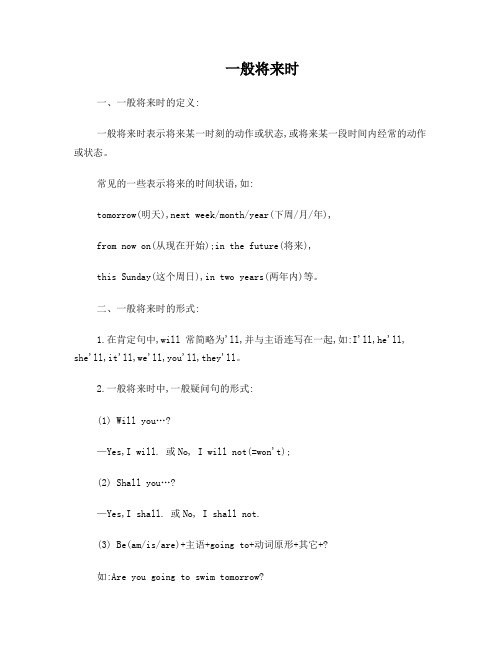
一般将来时一、一般将来时的定义:一般将来时表示将来某一时刻的动作或状态,或将来某一段时间内经常的动作或状态。
常见的一些表示将来的时间状语,如:tomorrow(明天),next week/month/year(下周/月/年),from now on(从现在开始);in the future(将来),this Sunday(这个周日),in two years(两年内)等。
二、一般将来时的形式:1.在肯定句中,will 常简略为'll,并与主语连写在一起,如:I'll,he'll, she'll,it'll,we'll,you'll,they'll。
2.一般将来时中,一般疑问句的形式:(1) Will you…?—Yes,I will. 或No, I will not(=won't);(2) Shall you…?—Yes,I shall. 或No, I shall not.(3) Be(am/is/are)+主语+going to+动词原形+其它+?如:Are you going to swim tomorrow?—Yes, I am./ No, I'm not.Is he/she going to play football next weekend?—Yes, he/she is./ No, he/she isn't.Are they going to go shopping this Sunday?—yes, they are./ No, they aren't.三、一般将来时的用法:1.一般将来时由“助动词shall(用于第一人称),或者will(用于第一、二、三人称)+动词原形”构成。
这种将来意义常常夹杂着情态意义即带有说话人的主观态度和看法,比如表示“预见”。
有时也含有“意愿”或“意图”的意思。
一般将来时
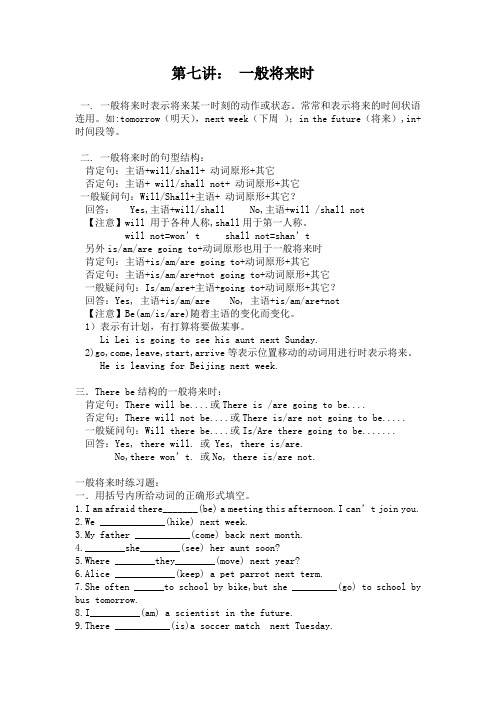
第七讲:一般将来时一. 一般将来时表示将来某一时刻的动作或状态。
常常和表示将来的时间状语连用。
如:tomorrow(明天),next week(下周);in the future(将来),in+时间段等。
二. 一般将来时的句型结构:肯定句:主语+will/shall+ 动词原形+其它否定句:主语+ will/shall not+ 动词原形+其它一般疑问句:Will/Shall+主语+ 动词原形+其它?回答: Yes,主语+will/shall No,主语+will /shall not【注意】will 用于各种人称,shall用于第一人称。
will not=won’t shall not=shan’t另外is/am/are going to+动词原形也用于一般将来时肯定句:主语+is/am/are going to+动词原形+其它否定句:主语+is/am/are+not going to+动词原形+其它一般疑问句:Is/am/are+主语+going to+动词原形+其它?回答:Yes, 主语+is/am/are No, 主语+is/am/are+not【注意】Be(am/is/are)随着主语的变化而变化。
1)表示有计划,有打算将要做某事。
Li Lei is going to see his aunt next Sunday.2)go,come,leave,start,arrive等表示位置移动的动词用进行时表示将来。
He is leaving for Beijing next week.三.There be结构的一般将来时:肯定句:There will be....或There is /are going to be....否定句:There will not be....或There is/are not going to be.....一般疑问句:Will there be....或Is/Are there going to be.......回答:Yes, there will. 或 Yes, there is/are.No,there won’t. 或No, there is/are not.一般将来时练习题:一.用括号内所给动词的正确形式填空。
一般将来时
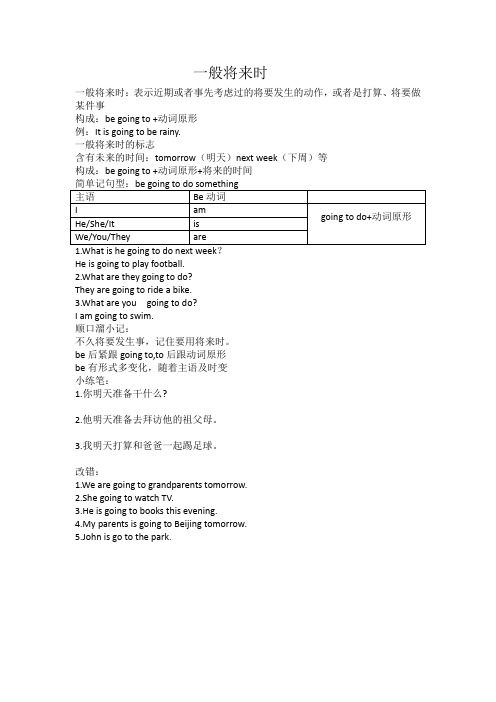
一般将来时
一般将来时:表示近期或者事先考虑过的将要发生的动作,或者是打算、将要做某件事
构成:be going to +动词原形
例:It is going to be rainy.
一般将来时的标志
含有未来的时间:tomorrow(明天)next week(下周)等
构成:be going to +动词原形+将来的时间
He is going to play football.
2.What are they going to do?
They are going to ride a bike.
3.What are you going to do?
I am going to swim.
顺口溜小记:
不久将要发生事,记住要用将来时。
be后紧跟going to,to后跟动词原形
be有形式多变化,随着主语及时变
小练笔:
1.你明天准备干什么?
2.他明天准备去拜访他的祖父母。
3.我明天打算和爸爸一起踢足球。
改错:
1.We are going to grandparents tomorrow.
2.She going to watch TV.
3.He is going to books this evening.
4.My parents is going to Beijing tomorrow.
5.John is go to the park.。
- 1、下载文档前请自行甄别文档内容的完整性,平台不提供额外的编辑、内容补充、找答案等附加服务。
- 2、"仅部分预览"的文档,不可在线预览部分如存在完整性等问题,可反馈申请退款(可完整预览的文档不适用该条件!)。
- 3、如文档侵犯您的权益,请联系客服反馈,我们会尽快为您处理(人工客服工作时间:9:00-18:30)。
改写句子
1)Nancy is going to go camping.(改否定句) Nancy going to go camping. 2)I’ll help them.(改否定句) I help them. 3)I’m going to get up at 6:30 tomorrow.(改一般疑问 句) to get up at 6:30 tomorrow? 4)We will meet at the bus stop at 10:30.(改一般疑问句) you meet at the bus stop at 10:30? 5)She is going to listen to music after school.(对划线部 分提问) she after school?
与一般将来时连用的时间状语 tomorrow 明天 this year 今年
the day after tomorrow 后天 soon 很快 in three days 三天后
next week 下周
in the future 将来
some day 将来的某一天
翻译练习
1. 我们将会赢得这场比赛。 We will win the match. 2. 她妈妈要去澳大利亚度假。 Her mother will go to Australia on vacation. 3. 爱丽丝将养一只宠物鹦鹉。 Alice will keep a pet parrot.
will,shall均可缩写为:'ll,如: I will= I'll; she will = she„ll;will not 和shall not分别可以 缩写为 won't 和shan't。
shall适用于第一人称I,We;而will适用于所有人称。通常 可以用will来代替shall。如:这个周末我我们将要去远足。
翻译练习
4.约翰半小时后做完家庭作业。 John will finish his homework in half an hour. 5. 我要成为一个计算机程序员。 I'll be a computer programmer. 6. 她会住在一套公寓里。 She'll live in an apartment.
2)下个星期一你打算去干嘛? 我想去打篮球。 ---What are you going to do next Monday? ---I am going to play basketball. 或者: ---What will you do next Monday? ---I will play basketball.
They are going to dance.
will
肯定句 否定句
There will be...
There (will not) won't be
一般疑问句 Will there be...? Yes, there will. \ No, there won't 回答
练一练:
Practice
A、根据中文,完成句子,每空一词。 1)我打算明天和我的朋友去旅行。 I go on a trip with my friends tomorrow. 或者: I go on a trip with my friends tomorrow.
含义:一般将来时表示在将来某一时间将要发生的动作或 存在的状态,也可表示将来某一段时间内经常发生的动作 或存在的状态。表示将来发生的动作或状态。 1、基本结构:will / shall +动词原形 系动词am,is,are的原形都是be。 例如:
庄欣将和我一起去公园。 eg:ZhuangXin will go to the park with me. eg:We shall go hiking this weekend.
What is the cat going to do ? will
It is going to drink/eat.
will
next week
What is he going to do next week He is going to go fishing.
will
What are they going to do ?
含一般将来时的句子变成特殊疑问句的时候,通常结构是:特殊 疑问词+一般疑问句的语序。也就是:疑问词+ will +主语+动词原 形+其他成分。如果是对主语提问,则主语部分就不在句子中出现。 例如: will leave for Beijing next week. I
这句话可转换为以下特殊疑问句: Who (对主语提问) will leave for Beijing next week?
改写句子
1)Nancy is going to go camping.(改否定句) Nancy isn’t going to go camping. 2)I’ll help them.(改否定句) I won’t help them. 3)I’m going to get up at 6:30 tomorrow.(改一般疑问 句) Are you going to get up at 6:30 tomorrow? 4)We will meet at the bus stop at 10:30.(改一般疑问句) Will you meet at the bus stop at 10:30? 5)She is going to listen to music after school.(对划线部 分提问) What is she going to do after school?
(对地点提问) Where do you leave for next week?
(对时间提问) When will you leave for Beijing?
根据括号中的提示完成句型转换。 1.The students will go to the zoo this Sunday. (变一般疑问句) Will the students go to the zoo this Sunday? 2. Mike will finish middle school in one year. (变否定句) Mike won't finish middle school in one year. 3. He'll ring you tonight. (对划线部分提问)
When will he ring you?
4. She will come to see us this weekend. (对划线部分提问)
Who will come to see us this weekend?
“There be”句型的一般将来时 There will be +名词+其他成份。意为“将会有 ……”
练一练:
actice
A、根据中文,完成句子,每空一词。 1)我打算明天和我的朋友去旅行。 I am going to go on a trip with my friends tomorrow. 或者: I will go on a trip with my friends tomorrow.
一般将来时的疑问句形式及回答
含一般将来时的句子变成一般疑问句只需把will或shall提到主语 前面即句首,并大写首字母就可以了。例如:你下周要去北京。
You will leave for Beijing next week. 这句话变成一般疑问句就是Will you leave for Beijing next week? 肯定回答是:Yes, I will.否定回答是:No, I won't.
2)下个星期一你打算去干嘛? 我想去打篮球。 ---What next Monday? ---I play basketball. 或者: ---What you do next Monday? ---I play basketball.
3)你妈妈这个周末去购物吗?是,她要去买一些水果。 --your mother go shopping this ? ---Yes, she . She buy some fruit.
